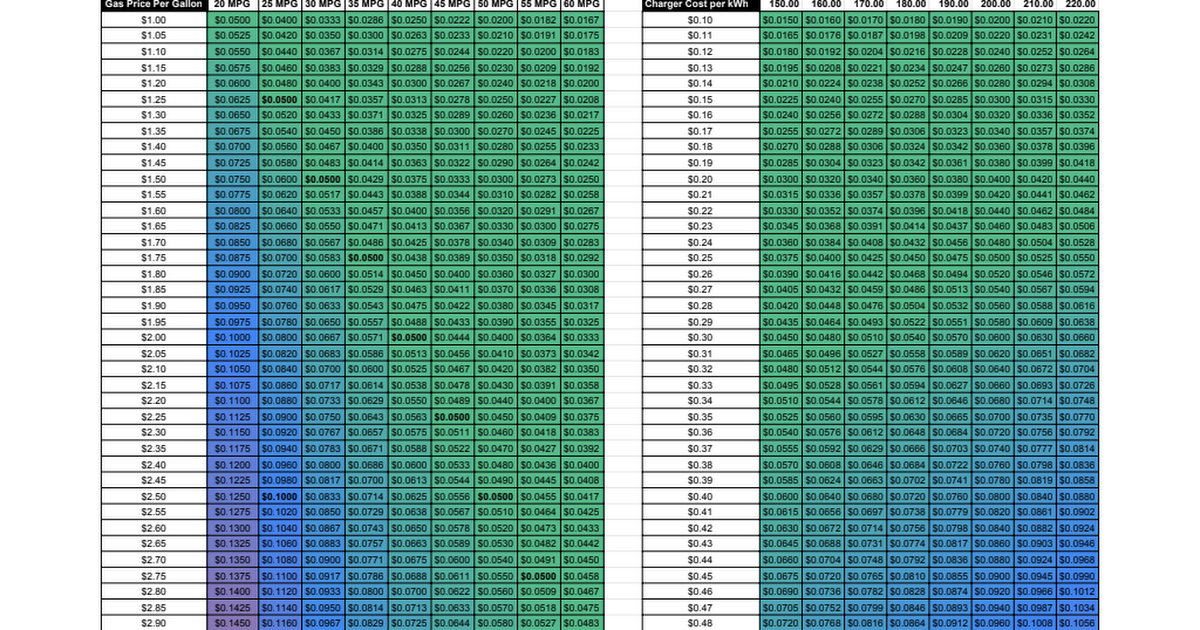Not sure if a tool like this exists elsewhere. I didnt do too much searching. I made this for personal use, but posting here in case it helps others.
My situation. I have a Model Y and a PHEV. I can get 40Mpg on PHEV. I wanted to see at what Supercharger rates it would be more efficient to take my PHEV instead of the Model Y. Important thing of note here, EVs are extremely cost effective if you can charge at home or at level 2 chargers. So this is mostly applicable for road trips, where only source of propulsion is superchargers and gas stations. Of course charging at start/destination would change the calculation as well (towards the Tesla).
Tables can be used in various ways. For example, if you only have a Tesla, but are curious if its more expensive per mile than current gas prices you would do the following:
1) Use right table, find row with charge cost (around here 58c/kw), then find column with your driving efficiency (I get about 270 watt/mile). So when we look at where these cross, I get 15.7 cents per mile
2) Now on the left table find current gas prices ($5.20 around here), I can see that Id have to have a 35MPG car or better for ICE to be more cost effective. This is same thing as saying my Model Y is as cost effective (again not counting much cheaper home/level 2 charging) as a 35MPG ICE.
Check what SuperCharger rate would be a good deal vs my PHEV (40MPG)
1) Left table find current gas price and PHEV MPG cross section. (13 cents per mile).
2) On the right table check my Watt/Mile column (270watt/mile) and go down until I get to 13 cents. Then look at the row name. 48 cents. So charging at 48 cents or cheaper makes Model Y more efficient for me (this will depend on your driving watt/mile efficiency). This does mean that with current gas prices it is cheaper for me to use PHEV over Model Y if I Superchargers are my only source or charge.
You can use it to see how much its costing you to charge at home (per mile)
1) Find per/kw rate on the right table (lets say 12c/kw), then column with your driving efficiency (lets say 270watt/mile). We see that it costs you 3.2 cents per mile.
2) You can then see that your 40MPG ICE would cost the same if gas was $1.30 per gallon. Which makes Tesla extremely cost efficient.
Anyways, hope its useful to someone else.

 docs.google.com
docs.google.com
My situation. I have a Model Y and a PHEV. I can get 40Mpg on PHEV. I wanted to see at what Supercharger rates it would be more efficient to take my PHEV instead of the Model Y. Important thing of note here, EVs are extremely cost effective if you can charge at home or at level 2 chargers. So this is mostly applicable for road trips, where only source of propulsion is superchargers and gas stations. Of course charging at start/destination would change the calculation as well (towards the Tesla).
Tables can be used in various ways. For example, if you only have a Tesla, but are curious if its more expensive per mile than current gas prices you would do the following:
1) Use right table, find row with charge cost (around here 58c/kw), then find column with your driving efficiency (I get about 270 watt/mile). So when we look at where these cross, I get 15.7 cents per mile
2) Now on the left table find current gas prices ($5.20 around here), I can see that Id have to have a 35MPG car or better for ICE to be more cost effective. This is same thing as saying my Model Y is as cost effective (again not counting much cheaper home/level 2 charging) as a 35MPG ICE.
Check what SuperCharger rate would be a good deal vs my PHEV (40MPG)
1) Left table find current gas price and PHEV MPG cross section. (13 cents per mile).
2) On the right table check my Watt/Mile column (270watt/mile) and go down until I get to 13 cents. Then look at the row name. 48 cents. So charging at 48 cents or cheaper makes Model Y more efficient for me (this will depend on your driving watt/mile efficiency). This does mean that with current gas prices it is cheaper for me to use PHEV over Model Y if I Superchargers are my only source or charge.
You can use it to see how much its costing you to charge at home (per mile)
1) Find per/kw rate on the right table (lets say 12c/kw), then column with your driving efficiency (lets say 270watt/mile). We see that it costs you 3.2 cents per mile.
2) You can then see that your 40MPG ICE would cost the same if gas was $1.30 per gallon. Which makes Tesla extremely cost efficient.
Anyways, hope its useful to someone else.
Tesla Supercharger vs Gas comparison
Data Cost Per Mile,Watt Hour per Mile Gas Price Per Gallon,20 MPG,25 MPG,30 MPG,35 MPG,40 MPG,45 MPG,50 MPG,55 MPG,60 MPG,Charger Cost per kWh,150.00,160.00,170.00,180.00,190.00,200.00,210.00,220.00 $1.00,$0.0500,$0.0400,$0.0333,$0.0286,$0.0250,$0.0222,$0.0200,$0.0182,$0.0167,$0.10,$0.0150,$0.01...
Last edited:


